Does a Dishwasher Need a Dedicated Circuit?
Author: Omar Alonso | Editor: Omar Alonso
Review & Research: Jen Worst & Chris Miller

Are you feeling overwhelmed with the move into your new home? Or maybe you're remodeling the kitchen and introducing new appliances to the space? A dishwasher is one of the most sought-after appliances in new kitchen installations. Why do the dishes when you can have a machine do them for you? Now the question is does a dishwasher need a dedicated circuit?
How do you hook up a dishwasher to the electrical circuit? Can you just plug it in with the fridge? Or does a dishwasher have to be on its own dedicated circuit? Residential electrical codes say the dishwasher needs a dedicated circuit for safe operation.
It can't run on the same circuit as other appliances, lighting, or outlets. You'll need a dedicated 15-amp circuit to operate the dishwasher safely.
What Is a Dedicated Circuit?
How is a dedicated circuit different from your home's electrical outlets? A dedicated circuit has a separate breaker in the electrical box. The reason for using a dedicated circuit is to prevent overload of the electrical system and a short, or the potential of starting an electrical fire.
Essentially, a dedicated circuit is a safety measure for energy-intensive appliances like the dishwasher. The circuit breaker trips when it detects an abnormality, like a surge, in the electrical system. The breaker flips, cutting off the dishwasher's power supply before something goes wrong.
You can't use a dedicated circuit as a regular outlet; it's independent.
How Do You Identify a Dedicated Circuit?
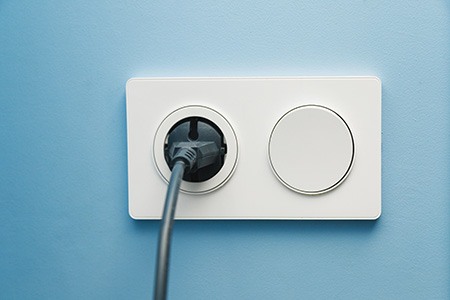
Operating energy-intensive appliances like dishwashers, high-power microwaves, and fridge require you to hook them into a dedicated circuit. This setup gives you an efficient and safe operation of the appliance. You avoid the risk of overload and the potential of starting an electrical fire that fries the electrical system and possibly burns down the house.
Finding out if you have a dedicated circuit operating these appliances is straightforward. A dedicated circuit has a single receptacle for plugging in an appliance, while standard circuits have several. Take a look at the breakers inside the electrical box, and you'll see dedicated circuits labeled as such.
What Size Breaker Does a Dishwasher Need?
Typically, dedicated circuits have a 20-amp breaker; you'll see this rating marked on the breaker. If you have a home built before the 1970s, call an electrician to help you identify the dedicated circuits in your home and on the breaker board.
Does a Dishwasher Need a Dedicated Circuit?
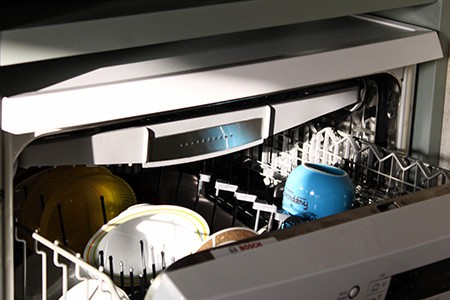
At a minimum, you'll need a circuit running only the dishwasher, no matter the type of dishwasher, and no other appliances to ensure safe operation. The dishwasher is an energy-hungry appliance and requires 110 to 120 volts during operation. The amount of electricity used by the dishwasher varies, depending on which stage of the wash cycle is running and the appliance model.
NFPA National Electrical Code requirements recommend dishwashers run on a dedicated circuit with a dedicated circuit breaker. According to the code, the minimum requirements for a dedicated circuit are defined as a 15-amp circuit delivering 120 to 125 volts.
Failing to follow the parameters of the electrical code means your home has the risk of failing a safety inspection if you decide to sell the property in the future. Most residential homes come with approximately seven dedicated circuits on the breaker board.
Despite these recommendations for dedicated circuits, it's possible to connect the dishwasher to an outlet and have it operate as intended. However, the outlet should be grounded, dedicated to the dishwasher alone, and connected to an appropriate 15 to 20-amp breaker.
If the outlet meets these requirements, you can plug in the dishwasher and operate it without requiring specialized receptacles or devices. But you might want to reconsider this strategy if the dishwasher doesn't have a pre-installed wall plug.
The dishwasher also requires Ground Fault Circuit Interrupters (GFCI) protection. The requirement is essential for appliances operating in areas around the home where the device may come in contact with water sources.
The GFCI protector comes built into the power supply for the dishwasher. The device's purpose is to protect the homeowner operating the appliance from experiencing an electrical shock. The GFCI protector breaks the circuit when it notices an imbalance in the current flow to the appliance.
The National Electrical Code states it's essential to add a GFCI outlet when installing dishwashers. The GFCI protects the user and prevents damage to the circuit if the appliance comes in contact with external water sources during operation.
The electrical code included the requirements of outdoor appliances meeting GFCI standards in 1973. Eventually, the code included the use of GFCI circuits for other appliances in the laundry room, bathroom, and garage in later years.
Interestingly, running a dishwasher on a GFCI-protected circuit was only introduced to residential electrical code in 2020.
Dedicated Circuits vs. Outlets
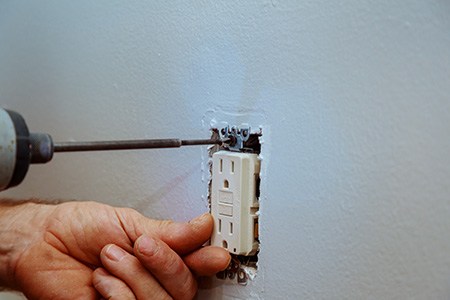
Does a dishwasher need a dedicated circuit? Yep. A dedicated circuit acts as a safeguard to the electrical system if the dishwasher short-circuits or malfunctions. The breaker in the breaker box running the dishwasher trips automatically, disconnecting the current delivery to the circuit during a short or malfunction.
The protection offered by the dedicated circuit has the dual purpose of protecting the appliance and preventing the current from damaging other connected circuits in the electrical system. If the breaker trips, you'll manually access the breaker box and reset the breaker to restore current to the circuit.
While it's possible to run a dishwasher on an outlet, it's risky and not the best choice for the safety of the electrical system and the home's occupants. Technically, you can connect the dishwasher to a 110-volt outlet if it's connected to a grounded, dedicated breaker in the electrical system.
The 110 volts provided by the outlet are within the operating requirements for running the dishwasher. As a result, you can use the appliance provided you don't run anything else on the outlet. Never run a dishwasher on the same outlet as the microwave or fridge, as that's a recipe for an electrical disaster.
The dishwasher has a huge demand for electricity to operate effectively and efficiently. Adding other energy-intensive appliances to the circuit overloads the outlet, causing the tripping of the corresponding circuit breaker.
What Does It Cost to Install a Dedicated Circuit for the Dishwasher?
While it's not common, some homes in the United States, usually those constructed before the 970s, might have no dedicated circuits in the electrical system. Updating your electrical system to include dedicated circuits to meet the electrical code and reduce the risk of electrical failures and fires is recommended.
Installing a dedicated circuit to the electrical system can cost approximately $600. This cost may differ depending on your location in the United States, the amount of work required in fitting the dedicated circuit to the electrical system, and the materials used in the job.
Considering these variables, the average cost of installing a dedicated circuit to the electrical system in the United States can range between $250 to $1,500. If you need a dedicated circuit installed in your home, get three quotes from local electricians before approving the work.
Remember, the lowest price isn't always the best choice. The electrician's reputation and the quality of their work count just as much as the price of the job.
Other Kitchen Appliances Requiring Dedicated Circuits
Does a dishwasher need a dedicated circuit? Yes, but the dishwasher isn't the only power-hungry device in the home requiring operation on a dedicated circuit. Some other appliances requiring dedicated circuits for safe operation include the following:
- Refrigerators
- Garbage disposals
- Ovens
- Stovetops
- High-power built-in microwaves
Please follow the approved installations including powering these on dedicated circuits.
FAQs Regarding Dishwasher Electrical Requirements
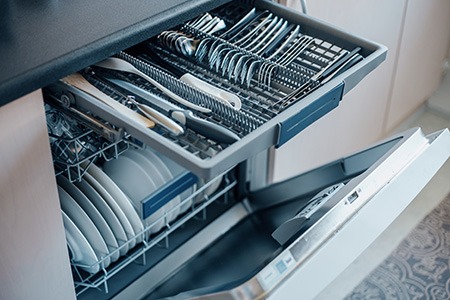
Does a dishwasher have to be on its own circuit? Yes, and once you know that answer you’ll obviously want to know all the details. Let’s dig into those now.
What Are the Minimum Amp Requirements for Dishwasher Circuits?
The average residential dishwasher requires a dedicated 10-amp circuit for safe operation. However, the amp rating can vary between models and brands. If you're unsure about your dishwasher model's amp rating or power requirements, consult the owner's manual you received when purchasing the appliance. If you bought the unit pre-owned, and don't have an owner's manual, look up the unit's specs on the manufacturer's website or contact their customer service department.
Do I Need to Hire an Electrician to Connect My Dishwasher to a Dedicated Circuit?
If you're moving into a home built before 1970, the electrical system might have no dedicated circuits. You'll have to hire an electrician to wire one in. Most states require electrical work conducted on residential electrical systems to be carried out by a licensed electrician.
What Connections Do Dishwashers Need?
Apart from a dedicated circuit, the dishwasher also requires access to the home's water supply using a standard 3/4" connection, suitable for standard water valves. The isolator valve must feature installation to an adjacent unit, allowing you to turn off the water supply to the unit.
Key Takeaways Regarding Dishwashers & Dedicated Circuits
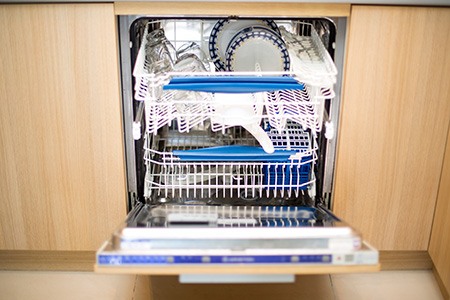
- The dishwasher requires a dedicated circuit for safe operation.
- Failing to run the dishwasher on a dedicated circuit places pressure on the electrical system and increases its risk of catastrophic failure.
- While not recommended, you can run a dishwasher on an outlet, but you can't connect any other appliances to the outlet.
- Both the National Electric Code and National Fire Prevention Association rules agree that dishwashers should run on a dedicated circuit for safe operation.
- According to the National Electric Code, the dishwasher should also feature GFCI circuit protection for safe operation.
So, Does a Dishwasher Need a Dedicated Circuit?
That’s the question of the hour: does a dishwasher need a dedicated circuit or not? The answer is yes, and you can consult the information above for the in-depth details. Just know that you can’t get around it, so accept the inevitable and either learn what you need to do or hire a professional to get it done! Best of luck to you.



